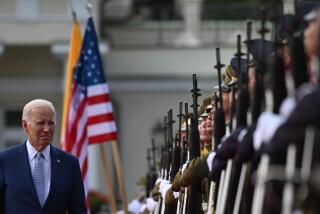Lithuanian Freedom Moves Put U.S. in Awkward Spot : Diplomacy: America has never acknowledged the Baltic states’ incorporation. But it doesn’t want to offend Moscow now.
- Share via
WASHINGTON — The United States is preparing for a particularly awkward turn in a 50-year diplomatic minuet if Lithuania, as expected, declares itself independent of the Soviet Union this weekend, U.S. and Lithuanian officials acknowledged Thursday.
The United States has never recognized the incorporation of Lithuania and its two Baltic neighbors, Estonia and Latvia, into the Soviet Union in the opening days of World War II. During much of the Cold War, Washington called on Moscow to grant freedom to the three “captive nations.”
But as that goal approaches reality in Lithuania, the United States has been leaning over backward to avoid offending Moscow, which could reduce Soviet President Mikhail S. Gorbachev’s willingness to allow secession. Instead of calling for “independence” or “freedom” in the Baltics, for example, the United States has said it supports “self-determination.”
And now, as the new Lithuanian Parliament prepares to vote on formal independence, Washington has indicated it will continue to tip-toe through the legal and diplomatic complexities.
In response to a question Thursday, State Department spokeswoman Margaret Tutwiler repeated that “the United States does not recognize the forcible incorporation of Estonia, Latvia and Lithuania into the Soviet Union. We believe that all parties to these disputes should settle their differences peacefully.”
Tutwiler warned that little more will be said in the immediate future, however, as the United States seeks to keep a low profile while it assesses its next moves, such as whether to recognize a new government in Lithuania and how to change the almost bizarre diplomatic relationship between Washington and Vilnius.
At present, the U.S. consul general in Leningrad represents American interests in Lithuania and the two other Baltic states. He periodically visits their capitals to reassert the U.S. position that those states are not recognized as part of the Soviet Union. He does not call on the top government leaders who were imposed by Moscow lest the contacts suggest they are regarded as legitimate representatives of the people.
The U.S. ambassador in Moscow, for his part, never visits the Baltic capitals. But a former U.S. diplomat in Moscow said the U.S. ambassador can visit the Baltic countryside. This results in an extraordinary division of responsibility between U.S. diplomats “at the city limits” of those capitals, he said.
In the future, now that fair elections have been held in Lithuania, contacts between U.S. diplomats and Lithuania’s new legislature may occur, the official predicted.
“We might actually seek out those people who have been popularly elected, while still avoiding most of the government officials,” he said. Yet he acknowledged that deciding which Lithuanians are legitimate representatives of the people would probably be more difficult.
Beyond these peculiarities, “our main concern now is not to turn the delicate situation (in Lithuania) into a confrontation” between Moscow and Vilnius, a U.S. official explained.
The Lithuanian Parliament is expected to declare independence, or perhaps a goal of eventual independence, after which “acceptable solutions should be negotiated” to the complex legal, economic and political problems arising from the divorce, the official said.
The Lithuanian charge d’affaires in Washington, Stasys Lozoraitis Jr., said “we understand fully the U.S. position.”
“There is no point in offending or irritating the Soviets, and if something happened to Gorbachev, the next man may not be better. The day will come one day to exchange ambassadors (between Washington and Vilnius), but not now,” Lozoraitus said.
“Also, it would be incorrect to recognize a new government which has no real powers yet,” he added. “After the vote, Lithuania will still be part of the Soviet Union in practical terms for some time.”
The Parliament must pass new laws regarding ownership, and agreements must be reached with Moscow on separating a myriad of interlocking systems and institutions, from telephone and transportation networks to banks and military forces.
More to Read
Sign up for Essential California
The most important California stories and recommendations in your inbox every morning.
You may occasionally receive promotional content from the Los Angeles Times.













